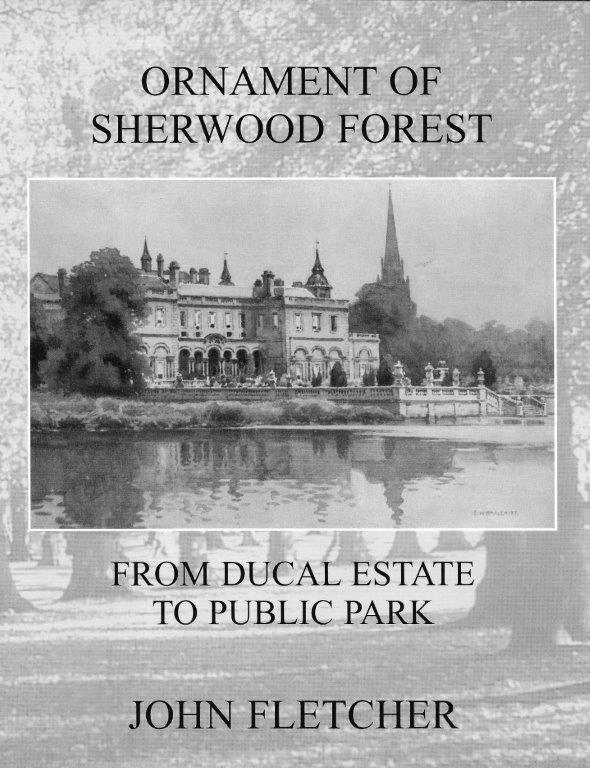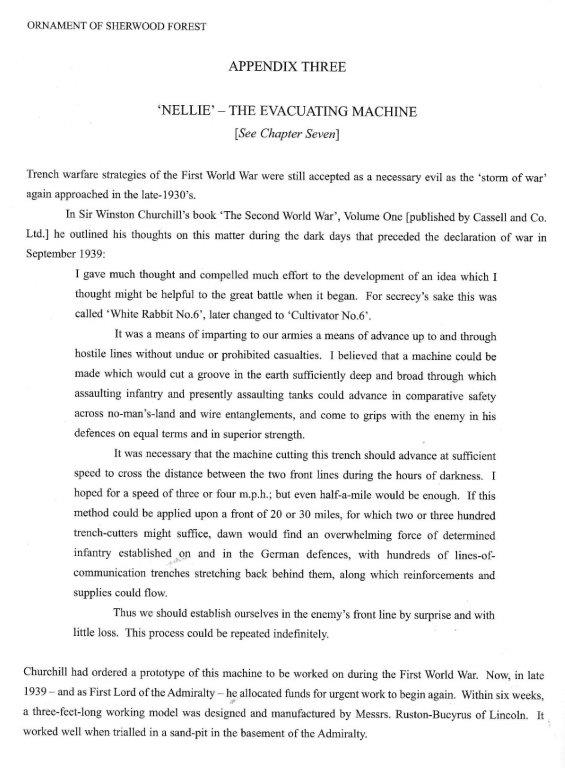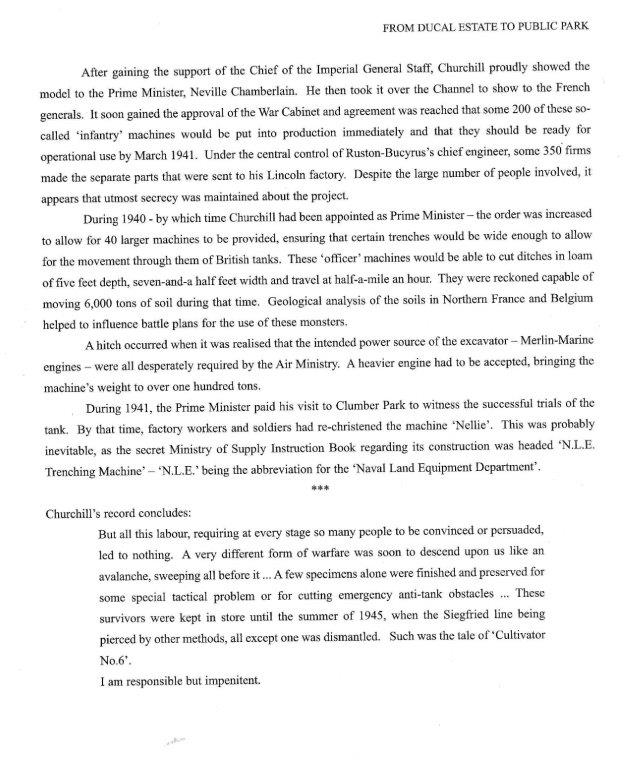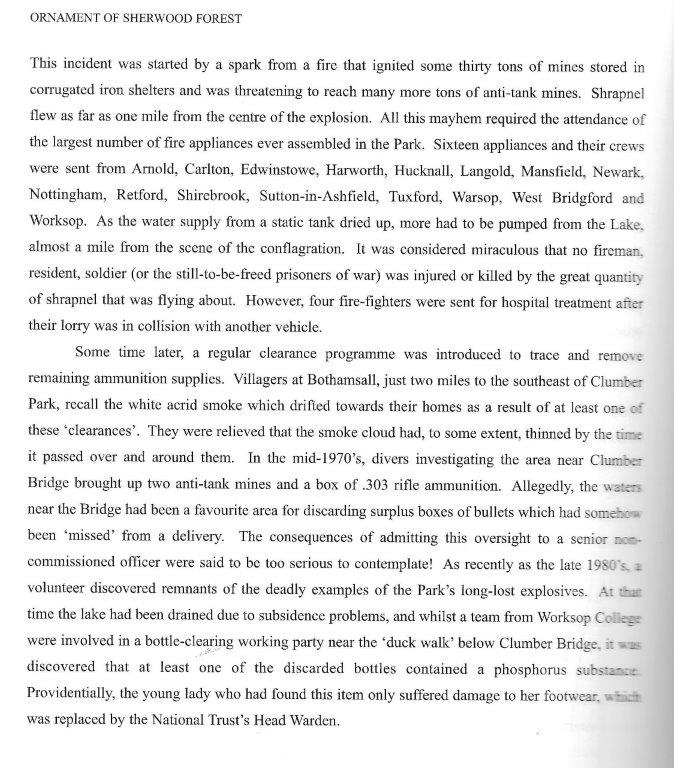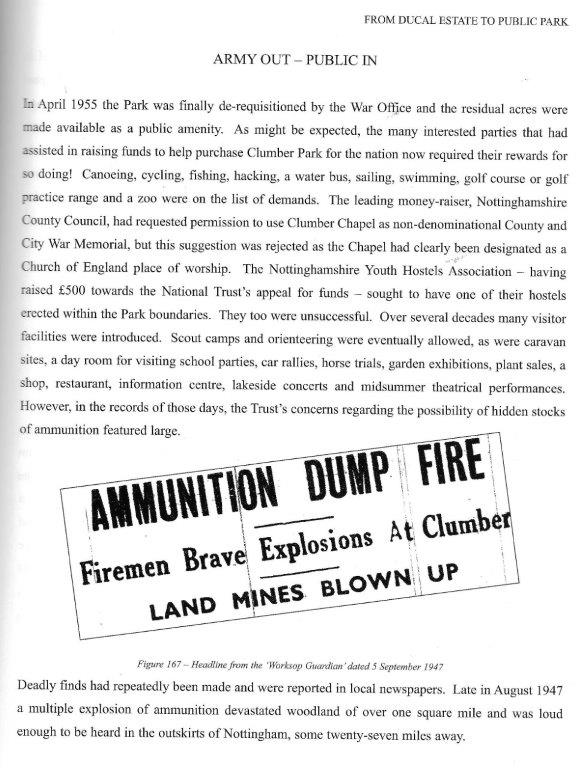Sherwood Forest during and after World War II
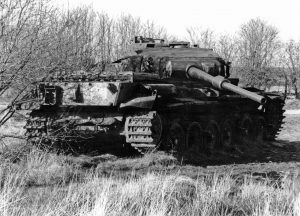
Centurion Tank Budby Heath 12th April 1987
” Post-war security for munitions being withdrawn the camp was converted first to a Prisoner of War (PoW) when it was forcibly closed as it was in such poor condition. Some of the later came to live at Thoresby, and three of these were still in residence in 1990s.
Camp then to a Displaced Persons Camp 1948-1953The German Prisoners of War were brought here to work on the farms. There was also a large camp of prisoners at Carburton. It was just past Carburton crossroads on the way to Worksop past the lodge on the left-hand side and up a lane that goes to Fairwood.
All the Germans had been sailors (U-boat/submarine prisoners) They were let out at night“, they could not get away as there was nowhere to go. The lads in the village, who had been in the navy during the war, used to sit on the wall on the corner, opposite the Royal Oak-near the Forest Lodge. The Germans would come walking by and the village lads used to talk to them about where they had been and when had they been taken prisoner.
Joseph Bennett, who worked at Thoresby Colliery, used to write to one of the prisoner, Freddie, who had worked in a pit in Germany. Joseph, worked on the pit top and Freddie had worked underground. Joseph asked Freddie why he was in a U-boat He shared that, ‘When they tell you, you go. They were going to shoot you. You don’t stand and argue! I hated every minute.’
His U-Boat, U-608, was sunk in the Bay of Biscay. He was rescued by the crew of the HMS Wren. He was given a picture of the Wren to keep and he was, ‘over the moon’ to be alive. “
Written by J Bennett for the Acorn
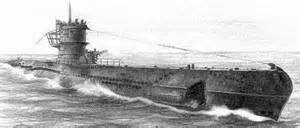
U-Boat U-608
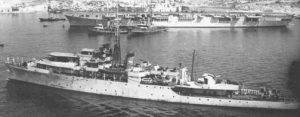 HMS Wren
HMS Wren
Joseph Bennett 1923-2016
Local campaign to remove the Army from Sherwood Forest.
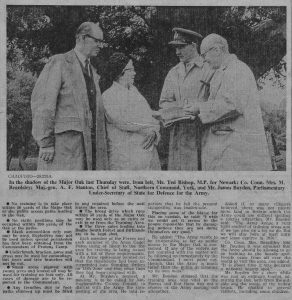
Ammunition in the forest, has, and continues to be an issue.
The Men of Edwinstowe who returned.
Stone Family. Below are the two sons of James Stone, Verger at St Mary’s (1903-1938) who lived at 16 Church Street. James Stone died in Nottingham in 1961.
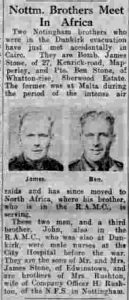
James Stone St Mary’s Verger Application Letter 1903
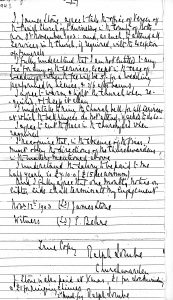
A World War 2 Veteran – Cecil Whitworth
Cecil Whitworth, aged 86, is one of a family of four born to Alice and Sydney Whitworth at a now demolished cottage on the premises of the former Dalby’s Farm on Mill Lane. Cecil was named after Edwinstowe’s Poet Laureate, Cecil Day Lewis. Sydney was an ostler, in charge of pit ponies at Clipstone Colliery, and Cecil himself, upon leaving school, worked as a gardener for Jim Hayes, Bolsover Colliery Company’s floating manager, who lived in Forest Town.
On 30th May Cecil was drafted into the army and ordered to report to Hanley, in the Potteries, where he was recruited into the 13th Battalion of the South Staffordshire Regiment. He completed his initial training, over a period of eighteen months, in Snettisham, Hunstanton and Heacham (which is noted for its lavender fields). At that point his regiment was wound up and he was transferred to the 104 Light Antiaircraft Regiment which was based at Tonbridge, Kent. It was then that he received driving instruction at Sandringham, learning how to handle a 15cwt Bedford van. Cecil’s regiment then entrained for Liverpool, where a thousand soldiers and RAF personnel boarded the troopship Mulltan which set sail for Basra, a port in south-eastern Iraq, from where they were dispatched to Baghdad. During his time in Iraq he drove a Bedford Bofor, which had a gun in tow. His Middle East service, where he was engaged in military manoeuvres, encompassed time in Lebanon, Israel, Syria, the Sinai peninsula and Egypt, where he was stationed at Alexandria and Cairo. The 104’s were disbanded and the personnel were transferred to the Yorkshire Dragoons, who were ordered to leave Port Said for Italy, to join the invasion force. Cecil served in Naples and in Rome, after which he joined the 1st Battalion the Buffs. He was wounded when flying shrapnel tore into both his hands, necessitating six weeks’ convalescence. On his recovery he was posted to Greece, along with the 56th Division, and he served as a driver-mechanic. In an amazing coincidence he met Don Cuthbert, a boyhood friend, in Heliopolis. He was in Salonika when peace was proclaimed and he returned to England where he was demobbed at Aldershot, on the 19th September, 1946.
Cecil and his wife, Christine, are staunch members of the Royal British Legion which they have served with distinction for many years.
Denise Wood
 Edwinstowe Historical Society
Edwinstowe Historical Society